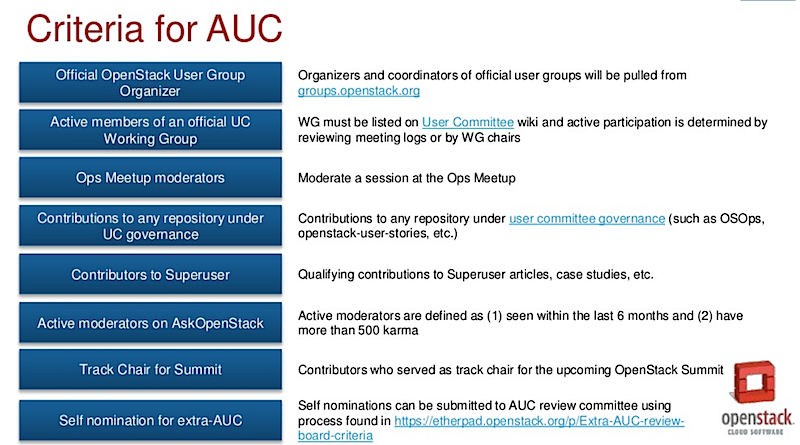Thousands of people around the world make OpenStack what it is – and not just by contributing code.
To recognize their efforts, a group of community members put their heads together to define what makes an Active User Contributor (AUC). Whether you help others out by moderating on ask.openstack.org organize a User Group or write an original article for Superuser, you can join the ranks of the 250 or so Stackers who earned it for the Barcelona Summit
Here all the ways you can attain it:
Join them and you’ll have the AUC designation on Summit badges and voting rights in User Committee elections. More benefits are in the works (stay tuned!)
Superuser talked to Shamail Tahir – who spearheaded the group along with Maish Saidel-Keesing and Edgar Magana, Jon Proulx, Shilla Saebi and is also a super-active Stacker – about how the AUC will influence the larger community and how he organizes his own community efforts. (Spoiler alert: sleep deprivation!)
What do non-technical community members bring to OpenStack?
I think some of the AUC are also technical community members but not necessarily developers or involved with upstream projects. AUCs, in general, bring a personal perspective on things they had to learn about OpenStack since they didn’t write the code.
This perspective brings multiple benefits to the community in terms of local user group organizers curating content they believe beneficial to our end-users and ecosystem to OpenStack-powered companies sharing their experiences/requirements in working groups with other parties that have a common objective (whether it’s making OpenStack successful in the enterprise, figuring out common needs for research/academic clouds, or making OpenStack a good foundation for NFV).
Now that the AUC (Active User Contributor) Recognition Working Group has disbanded – what are you working on?
I will continue to work the things I have been working on alongside AUC recognition such as the Enterprise and Product Working groups, Superuser TV, and the Interop Working Group (formerly known as DefCore). I have also been working on operator tags to increase the information available through the OpenStack project navigator and the COA study guide but both of these initiatives could use some more focus. I think most of the time I spent on AUC recognition will now be spent on operator tags and the COA study guide.
I am also running for the OpenStack Board as an Individual Director for 2017 since there are numerous areas that are a priority for the board next year that align with my community experience.
Any tips for organizing/maximizing all the community work you do?
Don’t sleep. Just kidding, kind of. I balance my work and community responsibilities by filling the peaks and valleys from each duty. It is very rare that both work and community commitments are racing against each other, so I shift between the two as needed, without issue, since my company understands the importance of contributing to open source communities.
I also work in community areas that compliment each other (Enterprise and Product WG, Interop and Operator Tags, AUC and WG experience, etc.) so that helps reduce the amount of “ramping up” I have to do when joining new community initiatives. If I ever do get into a situation where I have immediate work in both areas, then I do end up cutting down on sleep temporarily. 🙂
- OpenStack Homebrew Club: Meet the sausage cloud - July 31, 2019
- Building a virtuous circle with open infrastructure: Inclusive, global, adaptable - July 30, 2019
- Using Istio’s Mixer for network request caching: What’s next - July 22, 2019

)










